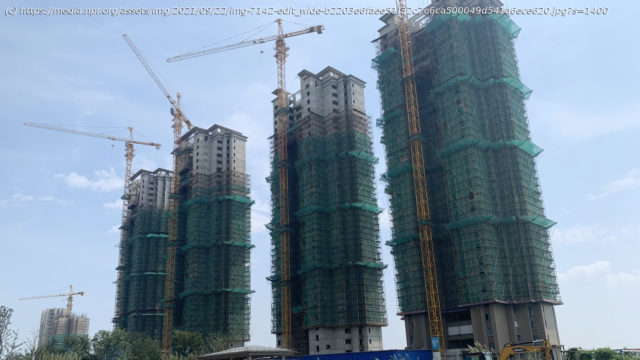TAICANG, China – The one-bedroom apartment was to be Penelope Wu’s retirement home, an escape from the bustle of Shanghai – or, at …
TAICANG, China – The one-bedroom apartment was to be Penelope Wu’s retirement home, an escape from the bustle of Shanghai – or, at least, that’s how Evergrande, the Chinese property developer, painted it. To jump in line ahead of hundreds of other prospective home buyers, Wu paid the sticker price of about $200,000 in full last year, before construction had even broken ground. « It did strike me as weird that Evergrande wanted the cash up front. I did not know then that they were so desperate for money, » Wu says as she walks her dog outside her uncompleted building in Taicang’s Cultural City project. The mixed-development project, an hour’s drive from Shanghai, has been halted mid-construction as Evergrande scrambles to pare down its debt under orders from Chinese regulators. Wu and the buyers of an estimated 1.4 million Evergrande units all over China are now uncertain whether the properties they paid for will ever be built. Dozens of angry and worried investors have picketed Evergrande’s headquarters in the southern city of Shenzhen for weeks. They bought investment products from Evergrande that now look nearly worthless, as its Hong Kong-listed stock plummeted by nearly 90% percent in value this year. Evergrande is set to default on at least one tranche of bond interest payments totaling around $120 million, due at the end of September. (It said on Wednesday it had « resolved » one payment of more than $35 million on onshore bonds but has a second payment of more than $85 million on offshore bonds coming due on Thursday.) The embattled developer, China’s second-biggest by sale volume last year, is saddled with debt it cannot pay back: it owes a total of $368 billion in loans to banks, as well as liabilities to contractors and suppliers. The financial woes of the once-mighty developer highlight a showdown between two competing objectives for China’s Communist Party: to force China’s private sector away from speculative and risky lending practices which pushed debt to dangerous levels — while avoiding a financial meltdown and the collapse of the property sector, in which more than 70% of the nation’s urban wealth is locked up. « This is a part of long-term fiscal reform to de-risk, de-leverage, and to shift away from [local government] land financing. These two goals are a good thing, » says Bo Zhuang, the chief China economist at Loomis Sayles, an investment firm. « But there’s a risk of further spillover to other developers, potentially causing a banking crisis or debt crisis. » For nearly three decades, Evergrande – like dozens of Chinese developers – bet big on China’s booming infrastructure buildup.
Home
United States
USA — China The Evergrande Group's Debt Issues Could Be A Drag On China's Economy






